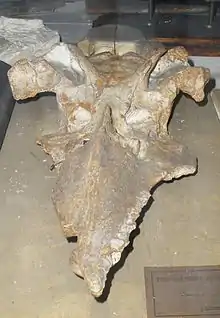Kentriodontidae
Kentriodontidae is an extinct family of odontocete whales related to modern dolphins. The Kentriodontidae lived from the Oligocene to the Pliocene before going extinct.[1]
| Kentriodontidae | |
|---|---|
 | |
| Rudicetus squalodontoides skull | |
| Scientific classification | |
| Kingdom: | Animalia |
| Phylum: | Chordata |
| Class: | Mammalia |
| Order: | Artiodactyla |
| Infraorder: | Cetacea |
| Clade: | Delphinida |
| Superfamily: | Delphinoidea |
| Family: | †Kentriodontidae Slijper, 1936 |
| Genera | |
|
See text | |
Taxonomy
Kentriodontids have been variously divided into three or four subfamilies: Kampholophinae, Kentriodontinae, Lophocetinae, and Pithanodelphinae.[1] However, recent cladistic studies have recovered Kentriodontidae as paraphyletic.[2][3][4][5][6] For instance, "Lophocetus" pappus may be a close relative of Lipotidae, "Delphinodon" dividum is basal to other delphinidans,[6] Incacetus is probably a member of Inioidea,[5] and Atocetus and Lophocetus have been recovered as a pontoporiid and ziphiid sister taxon respectively, while Hadrodelphis, Kampholophos, Macrokentriodon, and "Lophocetus" pappus are recovered in a clade phylogenetically intermediate between Kentriodon and derived delphinidans ((Inioidea+Lipotidae)+Delphinoidea).[7] Peredo et al. (2018) restrict Kentriodon to Kampholophos, Kentriodon, Rudicetus, and Wimahl, and remove Pithanodelphininae and its putative constituent genera (Leptodelphis, Pithanodelphis, Sarmatodelphis, Sophianacetus, and Tagicetus) as well as Microphocaena from Kentriodontidae.[8]
Genera
- Kampholophos
- Kentriodon
- Rudicetus
- Sophianaecetus
- Wimahl
- Belonodelphis?
- Liolithax?
Notes
- "PBDB".
- Geisler JH McGowen MR Yang G Gatesy J . 2011. A supermatrix analysis of genomic, morphological, and paleontological data for crown Cetacea. BMC Evolutionary Biology 11: 112.
- Murakami M Shimada C Hikida Y Hirano H . 2012. Two new extinct basal phocoenids (Cetacea, Odontoceti, Delphinoidea), from the upper Miocene Koetoi Formation of Japan and their phylogenetic significance. Journal of Vertebrate Paleontology 32: 1172–1185.
- Murakami M Shimada C Hikida Y Soeda Y Hirano H . 2014. Eodelphis kabatensis, a new name for the oldest true dolphin Stenella kabatensis Horikawa, 1977 (Cetacea, Odontoceti, Delphinidae), from the upper Miocene of Japan, and the phylogeny and paleobiogeography of Delphinoidea. Journal of Vertebrate Paleontology 34: 491–511.
- Pyenson ND Vélez-Juarbe J Gutstein CS Little H Vigil D O’Dea A . 2015. Isthminia panamensis, a new fossil inioid (Mammalia, Cetacea) from the Chagres Formation of Panama and the evolution of ‘river dolphins’ in the Americas. PeerJ 3: e1227.
- O. Lambert, G. Bianucci, M. Urbina and J. H. Geisler. 2017. A new inioid (Cetacea, Odontoceti, Delphinida) from the Miocene of Peru and the origin of modern dolphin and porpoise families. Zoological Journal of the Linnean Society 179:919-946.
- Post K, Louwye S, Lambert O. (2017) Scaldiporia vandokkumi, a new pontoporiid (Mammalia, Cetacea, Odontoceti) from the Late Miocene to earliest Pliocene of the Westerschelde estuary (The Netherlands) PeerJ 5:e3991 https://doi.org/10.7717/peerj.3991
- Carlos Mauricio Peredo, Mark D. Uhen & Margot D. Nelson (2018): A new kentriodontid (Cetacea: Odontoceti) from the early Miocene Astoria Formation and a revision of the stem delphinidan family Kentriodontidae, Journal of Vertebrate Paleontology, DOI: 10.1080/02724634.2017.1411357
References
- Ichishima, H., Barnes, L. G., Fordyce, R. E., Kimura, M. and Bohaska, D. J. (1994), A review of kentriodontine dolphins (Cetacea; Deiphinoidea; Kentriodontidae): Systematics and biogeography. Island Arc, 3: 486–492. doi: 10.1111/j.1440-1738.1994.tb00127.x
- Kazár, E. 2005: A new kentriodontid (Cetacea: Delphinoidea) from the Middle Miocene of Hungary. Mitteilungen aus dem Museum fuer Naturkunde in Berlin Geowissenschaftliche Reihe, 8: 53–73. doi:10.1002/mmng.200410004
- Kazár, E. 2006: Sophianaecetus, a replacement name for Mediocris (Cetacea: Delphinoidea: Kentriodontidae). Fossil record, 9: 260. doi:10.1002/mmng.200600013
- Uhen, M.D. 2006: The generic name Mediocris (Cetacea: Delphinoidea: Kentriodontidae), belongs to a foraminiferan. Fossil record, 9: 259. doi:10.1002/mmng.200600012